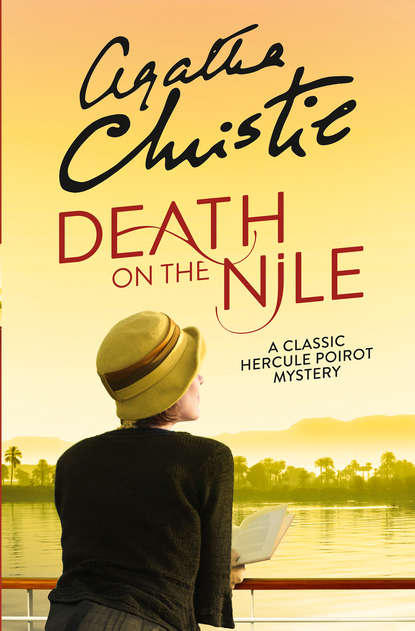По всем вопросам обращайтесь на: info@litportal.ru
(©) 2003-2025.
✖
Death on the Nile
Автор
Год написания книги
2019
Настройки чтения
Размер шрифта
Высота строк
Поля
He drew back a little. She had not seen him, and he watched her for a while without her suspecting his presence. Her small foot tapped impatiently on the ground. Her eyes, dark with a kind of smouldering fire, had a queer kind of suffering dark triumph in them. She was looking out across the Nile where the white-sailed boats glided up and down the river.
A face–and a voice. He remembered them both. This girl’s face and the voice he had heard just now, the voice of a newly made bridegroom…
And even as he stood there considering the unconscious girl, the next scene in the drama was played.
Voices sounded above. The girl on the seat started to her feet. Linnet Doyle and her husband came down the path. Linnet’s voice was happy and confident. The look of strain and tenseness of muscle had quite disappeared, Linnet was happy.
The girl who was standing there took a step or two forward. The other two stopped dead.
‘Hullo, Linnet,’ said Jacqueline de Bellefort. ‘So here you are! We never seem to stop running into each other. Hullo, Simon, how are you?’
Linnet Doyle had shrunk back against the rock with a little cry. Simon Doyle’s good-looking face was suddenly convulsed with rage. He moved forward as though he would have liked to strike the slim girlish figure.
With a quick birdlike turn of her head she signalled her realization of a stranger’s presence. Simon turned his head and noticed Poirot. He said awkwardly: ‘Hullo, Jacqueline; we didn’t expect to see you here.’
The words were unconvincing in the extreme.
The girl flashed white teeth at them.
‘Quite a surprise?’ she asked. Then, with a little nod, she walked up the path.
Poirot moved delicately in the opposite direction. As he went, he heard Linnet Doyle say:
‘Simon–for God’s sake! Simon–what can we do?’
Chapter 3 (#ulink_6148fcbf-35d9-5d21-811c-24cb6411bae3)
Dinner was over. The terrace outside the Cataract Hotel was softly lit. Most of the guests staying at the hotel were sitting at little tables.
Simon and Linnet Doyle came out, a tall, distinguished looking grey-haired man, with a keen, clean-shaven American face, beside them. As the little group hesitated in the doorway, Tim Allerton rose from his chair nearby and came forward.
‘You don’t remember me I’m sure,’ he said pleasantly to Linnet, ‘but I’m Joanna Southwood’s cousin.’
‘Of course–how stupid of me! You’re Tim Allerton. This is my husband’–a faint tremor in the voice, pride, shyness?–‘and this is my American trustee, Mr Pennington.’
Tim said: ‘You must meet my mother.’
A few minutes later they were sitting together in a party–Linnet in the corner, Tim and Pennington each side of her, both talking to her, vying for her attention. Mrs Allerton talked to Simon Doyle.
The swing doors revolved. A sudden tension came into the beautiful upright figure sitting in the corner between the two men. Then it relaxed as a small man came out and walked across the terrace.
Mrs Allerton said: ‘You’re not the only celebrity here, my dear. That funny little man is Hercule Poirot.’
She had spoken lightly, just out of instinctive social tact to bridge an awkward pause, but Linnet seemed struck by the information.
‘Hercule Poirot? Of course–I’ve heard of him…’
She seemed to sink into a fit of abstraction. The two men on either side of her were momentarily at a loss.
Poirot had strolled across to the edge of the terrace, but his attention was immediately solicited.
‘Sit down, Monsieur Poirot. What a lovely night!’
He obeyed.
‘Mais oui, Madame, it is indeed beautiful.’
He smiled politely at Mrs Otterbourne. What draperies of black ninon and that ridiculous turban effect! Mrs Otterbourne went on in her high complaining voice:
‘Quite a lot of notabilities here now, aren’t there? I expect we shall see a paragraph about it in the papers soon. Society beauties, famous novelists–’
She paused with a slight mock-modest laugh.
Poirot felt, rather than saw, the sulky frowning girl opposite him flinch and set her mouth in a sulkier line than before.
‘You have a novel on the way at present, Madame?’ he inquired.
Mrs Otterbourne gave her little self-conscious laugh again.
‘I’m being dreadfully lazy. I really must set to. My public is getting terribly impatient–and my publisher, poor man! Appeals by every post! Even cables!’
Again he felt the girl shift in the darkness.
‘I don’t mind telling you, Monsieur Poirot, I am partly here for local colour. Snow on the Desert’s Face–that is the title of my new book. Powerful–suggestive. Snow–on the desert–melted in the first flaming breath of passion.’
Rosalie got up, muttering something, and moved away down into the dark garden.
‘One must be strong,’ went on Mrs Otterbourne, wagging the turban emphatically. ‘Strong meat–that is what my books are–all important. Libraries banned–no matter! I speak the truth. Sex–ah! Monsieur Poirot–why is everyone so afraid of sex? The pivot of the universe! You have read my books?’
‘Alas, Madame! You comprehend, I do not read many novels. My work–’
Mrs Otterbourne said firmly: ‘I must give you a copy of Under the Fig Tree. I think you will find it significant. It is outspoken–but it is real!’
‘That is most kind of you, Madame. I will read it with pleasure.’
Mrs Otterbourne was silent a minute or two. She fidgeted with a long chain of beads that was wound twice round her neck. She looked swiftly from side to side.
‘Perhaps–I’ll just slip up and get it for you now.’
‘Oh, Madame, pray do not trouble yourself. Later–’
‘No, no. It’s no trouble.’ She rose. ‘I’d like to show you–’
‘What is it, Mother?’
Rosalie was suddenly at her side.
‘Nothing, dear. I was just going up to get a book for Monsieur Poirot.’

















